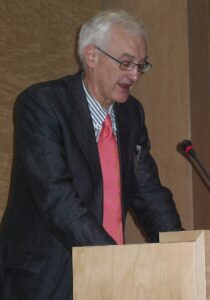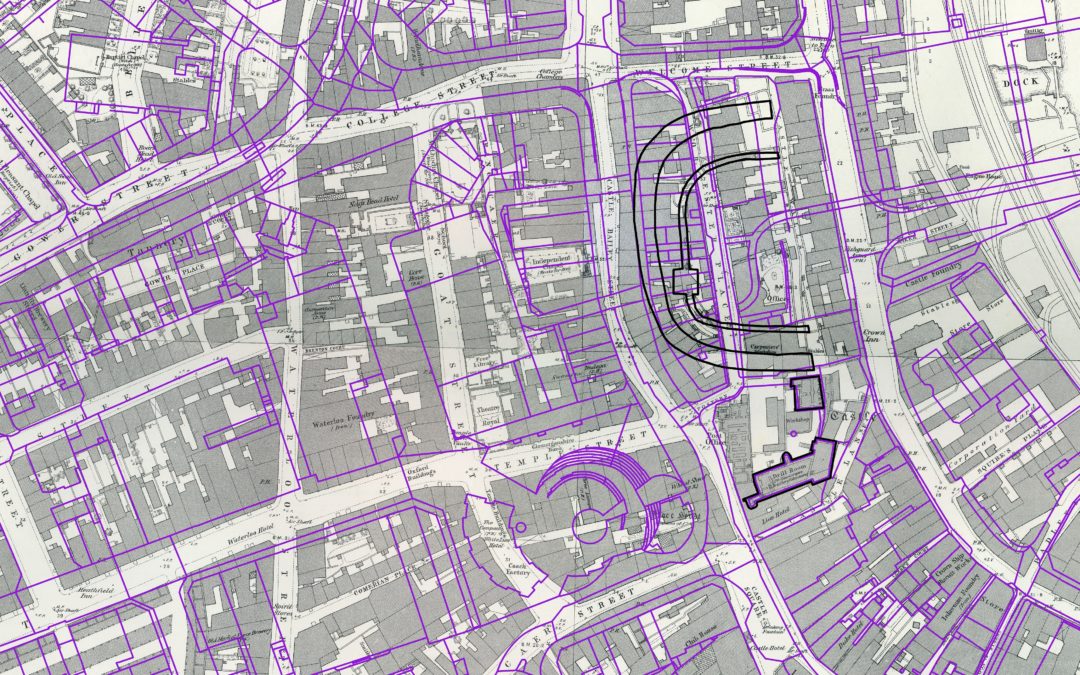Remembering Professor Derek Keene
 Derek Keene, who died recently of Alzheimer’s at the age of 78, was one of the leading figures in medieval and urban history over the past forty years. He was the founding director of the Centre for Metropolitan History at the IHR, and led the centre until 2002 when he was made Professor of Comparative Metropolitan History. He remained at the IHR, ever active, until his retirement in 2008.
Derek Keene, who died recently of Alzheimer’s at the age of 78, was one of the leading figures in medieval and urban history over the past forty years. He was the founding director of the Centre for Metropolitan History at the IHR, and led the centre until 2002 when he was made Professor of Comparative Metropolitan History. He remained at the IHR, ever active, until his retirement in 2008.
I had the good fortune, but also the daunting prospect, of succeeding Derek as CMH director in 2002. He made this transition incredibly easy, slipping easily into a professorial role which he hugely deserved and which allowed him to thrive and take forward his diverse research interests. By that point his reputation and influence were widely acknowledged in the UK and much further afield, through his many publications, projects and collaborations with colleagues that reflected a huge range of interests. His concerns as a historian had deep roots. He was influenced very early on by his father, Charles Henry (‘Harry’) Keene, a local historian who worked on the history of Northolt, where Derek grew up. Benefiting from state-funded education at school and then university, Derek always strongly believed that the study of history at all levels should be accessible and not be allowed to fall back into being an ‘elite’ activity. From his early career as a D.Phil. student at Oxford with W.A. Pantin, and then as a researcher with the Winchester Research Unit with Martin Biddle, he showed a curiosity and imagination which came to characterise his research and writing. As an archaeologist in his own right, Derek modelled an approach which saw material and documentary evidence as complementary, and essential to the study of the medieval urban past. As the leader of the ‘Social and Economic Study of Medieval London’, from 1979-1984, Derek brought this approach to medieval and early modern London, with microstudies of Cheapside and other areas of the city revealing much about the growth of London in that period, the relationships between people, economic and social life, and the physical fabric of the city. This work has been hugely influential amongst urban historians generally, as well as closer to home where it underpinned projects that the CMH developed later on (such as People in Place, Life in the Suburbs, directed by me, Vanessa Harding and Richard Smith). His interest in maps and mapping was a consistent feature of his work and thinking about cities, and some of his insights ultimately came to influence digital mapping projects such as Locating London’s Past and, especially, Layers of London.
The founding of the Centre for Metropolitan History in 1988 was a typically collaborative and visionary achievement. Derek won the invaluable support of the then director of the IHR, F.M.L. Thompson, and the Academic Secretary, Alice Prochaska, to set the up the centre, with the support of urban historians across the UK and beyond. It was conceived as a space, or ‘laboratory’ as he called it, for studying urban problems, often (though certainly not exclusively) through the lens of London’s rich and diverse history. In many senses the CMH anticipated the mission of the School of Advanced Study in terms of ‘research promotion and facilitation’ – the centre did this notably well under his leadership at a time when there were few ‘centres’ of this kind in UK HE. He was joined there by Olwen Myhill, who was a lynchpin throughout his career and who had worked with him on SESML, and by Heather Creaton. The Metropolitan History Seminar became an intellectually vibrant forum for discussion of issues in urban history across cities, countries and regions of the world.
Derek was extremely resourceful in gaining external funding for the many projects he directed at the CMH. He influenced and enabled the careers of a great many people: Vanessa Harding (who worked with Derek on SESML), Justin Champion, Craig Spence, Jon Lawrence, Iain Black, Jim Galloway, Margaret Murphy, Hannes Kleineke, Stefan Goebel, Carlos Lopez-Galviz, Emilia Jamroziak, Lien Luu and many others. He began supervising PhD students later in his career, but was a typically engaged and supportive supervisor of a diverse range of projects. The nature of the ‘metropolis’ was a problem that fed into much of his work – whether researching cities and their hinterlands and influence, metropolitan networks, or exploring the extent to which London or other cities can be characterised as ‘city states’. But so were more quotidian themes such as markets and fairs, urban crafts and skills, shopping, and the government of medieval London. He never shied away from complex or demanding projects, such as the huge multi-authored History of St Paul’s Cathedral, published in 2004, which he co-edited. As Derek put it himself: ‘Quite a lot of them [his projects] were linked by ideas about the physical form of the city – how it evolves over time, how areas are used, why particular districts had the form and sets of activities that were associated with them’. In retirement he continued to be hugely productive, having transplanted his many books and files to new rolling shelving in his basement – a project he took particular pleasure in. He continued to come to the IHR, though, and was often to be encountered roaming between the library’s excellent French, Low Countries, Italian, Eastern European as well as English local history collections, gathering comparative material for essays and articles.
As a historian Derek was immensely knowledgeable, capable of making often unexpected links between places and regions that drew on his wide reading, research and his collaborations with people and projects across Europe and beyond. He was highly (and infectiously) curious, always seeking to understand new approaches and get to grips with new evidence, in order to make these intellectual connections. If he occasionally over-awed those with whom he spoke, it was certainly not deliberate and reflective in fact of his enthusiasm and the intensity of his curiosity! His interest in others’ work, and sheer niceness shone out. It was hard to keep pace with him – literally so, given his renowned speed with which he would walk around the City. His many articles and essays speak to his wide-ranging interests as well as this curiosity and intellectual excitement about the past, and indeed its relevance to the present. He was instinctively collaborative, working with fellow urbanists across Europe on projects, publications and on conferences and other events; it is no surprise that the news of his death has been met by sorrow and dismay in many parts of the urban history community on the continent, in the US, Japan, as well as here in the UK.
Among the many projects and groups he was involved with were: the Royal Commission on Historical Monuments, English Heritage, the Commission for Architecture and the Built Environment (CABE), St Paul’s Fabric Advisory Committee, the Winchester Pipe Rolls project, the Museum of London, Museum of London Archaeology, London and Middlesex Archaeological Society, the Historic Towns Trust, the International Commission for the History of Towns, and the European Association of Urban Historians. He was also for many years a Trustee of the London Journal, and served as chair of the Editorial Committee, helping to cement its position as a wide-ranging and interdisciplinary journal. Many other projects and organisations benefited from his wisdom and advice: he had an abiding concern for the urban environment, contributing his unique perspectives to contemporary debates about planning, architecture, and urban form.
Beyond his many academic achievements Derek will be remembered with great affection by those who worked with him, or who encountered him at seminars or other occasions. He was always generous with his time and insights, sharing his perspectives but also listening to and absorbing those of others. He was a huge supporter of the work of the Institute and the School of Advanced Study, and a public advocate of their contributions in furthering research in the humanities. His work in retirement was cruelly cut short by Alzheimer’s. He will be greatly missed by his family, friends and colleagues past and present.
Further details
The IHR and Derek’s family hope to hold a memorial event later in the year to celebrate Derek’s life.

